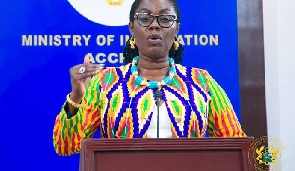 Communications and Digitalization Minister, Ursula Owusu-Ekuful
Communications and Digitalization Minister, Ursula Owusu-Ekuful
As the pace of introduction for new technologies accelerates, creating change in societal outcomes beyond the span of existing norms and laws, Communications and Digitalisation Minister, Ursula Owusu-Ekuful is urging Ghanaian ‘techpreneurs’ to be at the forefront of efforts to drive the digital economy’s contribution to growth of the country’s GDP.
And for this to happen, a collaborative regulatory environment must be developed to ensure that technology-related services which span multiple sectors receive the required, coordinated oversight where multiple regulators are involved, she noted.
Mrs. Owusu-Ekuful was speaking at the National Stakeholder Consultation for Review of the Ghana Digital Economy Policy on Wednesday, November 16, 2022, at the Accra Digital Centre.
The new policy
Following adoption of the ICT for Accelerated Development (ICT4AD) policy in 2003, Ghana developed several legislative reforms and a supportive regulatory environment; leading to investments in and adoption of technologies for various sectors of the economy. These initiatives began the country’s preparation for the digital economy, with its attendant opportunities and risks.
And over the last few decades, the policy and infrastructure-related reforms – with telecom services as the main driver – unlocked economic pathways by leveraging the mobile phone as a tool for connectivity, information services and digital financial services.
“These developments have led to the advancement of a local tech entrepreneurial ecosystem, related skills development, digital government platforms and the explosion of data and other emerging technologies – such as Artificial Intelligence, Advanced Data Analytics, IoT, blockchain metaverse and quantum computing,” Mrs. Owusu-Ekuful stated.
It is therefore vital to take cognisance of these developments, and set a new policy and strategic direction for the contemporary realities of the digital economy and evolving fourth industrial revolution (4IR), she added.
“Ultimately,” she said, “this new policy must address the issue of how to increase the digital economy’s contribution to the growth of our national GDP: addressing priorities such as job-creation and unlocking value in high-potential sectors while strengthening inclusion, safeguarding national interests and national security, and augmenting efficiency in public service delivery.”
New policy’s vision
Continuing, Mrs. Owusu-Ekuful said this policy seeks to establish an open, secure, hyper-connected and inclusive digital economy that unleashes the innovative genius of digital entrepreneurs across various sectors; creating sustainable jobs for the youth, enabling efficient delivery of government services, and positioning Ghana as a regional digital hub.
In the fifth and final rolling-out phase of the ICT4AD 2003 policy which applies from 2019 – 2022, the focus shifts to “sustaining economic development and growth toward improving national prosperity and global competitiveness”.
“As we look backward at what we have achieved so far in ICT development outcomes and set forth a future path, we are also influenced by lessons learned from the COVID-19 pandemic – reflected in the GhanaCARES programme’s focus on fast-track digitisation to achieve economic transformation,” Mrs. Owusu-Ekuful said.
She said government’s commitment to delivering seamless and efficient digital governance for citizens is reflected in the Ghana Integrated Digital Transformation (GIDT) Blueprint and its recommendation on anchoring digital government transformation on a robust Common National Digital Architecture (CNDA).
“The vision places firm sights on the next stage of digitalisation via harnessing technologies such as big data analytics and artificial intelligence to enhance precision in decision-making, and to deliver targetted outcomes including enhancing domestic revenue mobilisation,” she said.
She added: “Ultimately, this policy’s vision speaks to leadership, focus and empowerment in the evolving digital economy; through building capabilities and capacity in harnessing emerging technologies of the Fourth Industrial Revolution (4IR) to drive national economic transformation”.